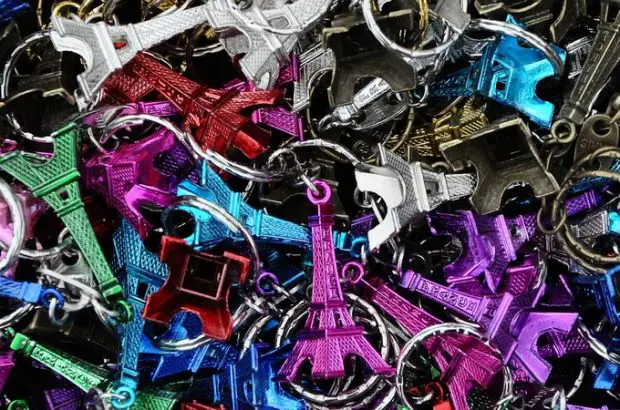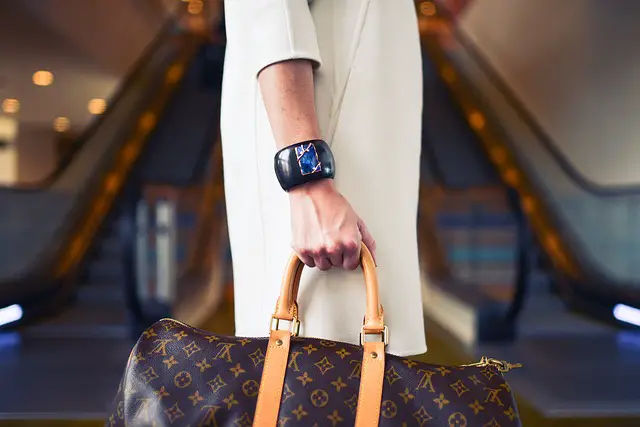As in all major cities, pickpockets are common in Paris. Cases are fairly rare, and I don’t think you’ll have to deal with a pickpocket when you visit Paris, but since you’ll probably be wandering around the tourist spots, the probability, though still low, increases.
From sleight of hand to jostling through crowds, pickpockets have plenty of tricks up their sleeves.
And let me reassure you, when there is theft, it’s rarely violent. Pickpockets try to avoid confrontation. As soon as they’re detected, they tend to flee.
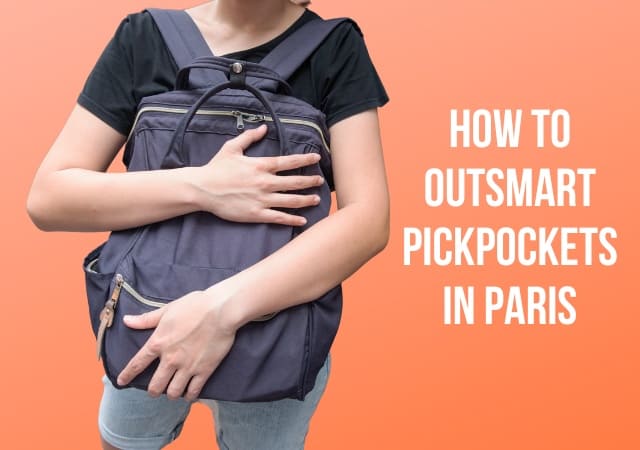
Why Do Pickpockets Target Tourists?
When you’re visiting a city like Paris, it’s easy to get distracted by all the sights and sounds.
Pickpockets know this, so they tend to target tourists who are busy taking photos, looking at maps, or just soaking up the city.
They also know that tourists often carry valuable things like phones, cameras, and sometimes cash.
How Safe is Paris Compared to Other Big Cities?
Pickpockets can be a problem in most large cities around the world, especially in areas where lots of tourists gather.
Cities like New York, Rome, Barcelona, and London also have pickpockets who use similar tricks to target visitors in busy areas. Paris is no different.
But keep in mind, most visitors to Paris enjoy their trip without any issues!
By staying alert and following a few simple tips, you’re likely to avoid any problems and have a safe, fun time exploring the city. Remember, Paris is generally as safe as any other major city if you’re careful with your belongings.
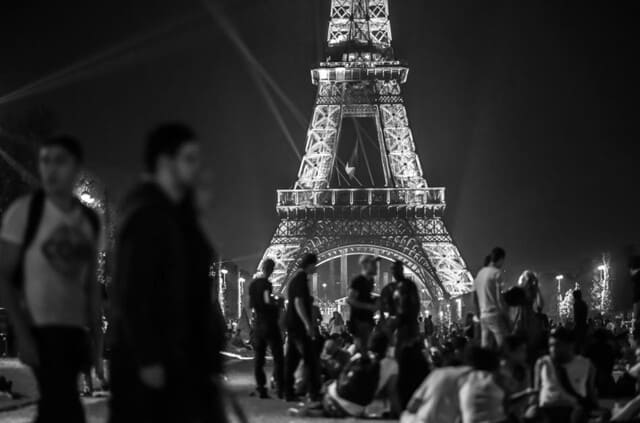
What Are the Methods of Pickpockets?
Most pickpockets don’t work alone. They often plan out how to distract someone so they can take something quickly and disappear. They don’t want you to notice them at all.
Their techniques are numerous:
- bumping into you so their partner can take advantage of the confusion to snatch your belongings.
- calling at a terrace table with a large card to cover the table and steal your belongings.
- the ketchup/mustard trick. Someone sprays your clothing with a substance (like ketchup), and their accomplice offers to help clean it up while rifling through your pockets.
All of this is thanks to the distraction they create, which is fascinating but very concerning.
They tend to operate in highly touristy areas, so if you’re visiting a monument or attraction, be sure to keep an eye on your belongings.
Why Pickpocket Tricks Work
Pickpockets are good at understanding how people react, and they use that to their advantage.
Their tricks work because they distract you, and when you’re distracted, it’s easy to forget about your things for a moment.
Here’s how they use psychology to catch you off guard:
- Creating Confusion: When something unexpected happens—like someone bumping into you or spilling something on you—your brain focuses on that event. During that split second, you’re not thinking about your phone or wallet. Pickpockets know this and use it to take advantage of the moment.
- Playing on Kindness: Sometimes, pickpockets act like they need help or are being friendly. They might ask for directions or pretend to be lost, hoping you’ll look away from your bag or pockets. They count on people wanting to be helpful or polite.
- Crowds and Close Spaces: Pickpockets know that crowded places like subway stations make people feel rushed and distracted. When you’re squished into a busy area, it’s hard to notice small movements, so a pickpocket can reach for your pocket or bag without you realizing it.
- Acting Like Ordinary Tourists: Some pickpockets even dress and act like tourists themselves. This helps them blend in so that you don’t suspect anything. They might pretend to be taking photos or looking lost, which makes them less suspicious.
- Using Teams: Pickpockets often work in groups to make their tricks more convincing. For example, one person might distract you while another person grabs your belongings. This teamwork makes it easier for them to slip away without you noticing.
Understanding these tactics can help you recognize when someone might be trying to distract you. Just staying aware and thinking twice when something feels “off” is often enough to keep your belongings safe!
Where Do Pickpockets Operate in Paris?
Pickpockets are mainly looking for easy prey who are not too familiar with the city and its habits. They can be found in two main places:
At tourist spots
Around the Eiffel Tower, there’s often a crowd. You’re offered trinkets to buy, approached for various reasons—it’s all ways to divert your attention and pick your pockets.
Some of the “riskiest” places:
- Around the Eiffel Tower
- The Champs Elysées
- The Louvre Museum and surrounding area
- The Sacré-Coeur area
- Leaving the Department Stores (Galeries Lafayette, Printemps)
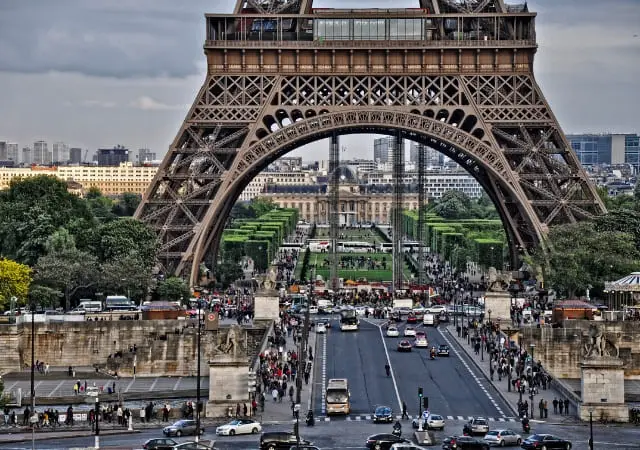
In the metro
This is a favorite spot for pickpockets, because the crowds are dense and, as a tourist, you’re unfamiliar with the subway stations, and it’s easy to be jostled around on the pretext that it’s crowded or that someone is strangely “blocking” people’s exit from the car at the beep.
The metro corridors are just as risky as metro cars.
During rush hour, even more so.
The most affected lines usually are :
- line 1: which passes through many tourist attractions such as the Champs Elysées and the Louvre
- line 6: Bir Hakeim station in particular, which is the one to take to get to the Eiffel Tower.
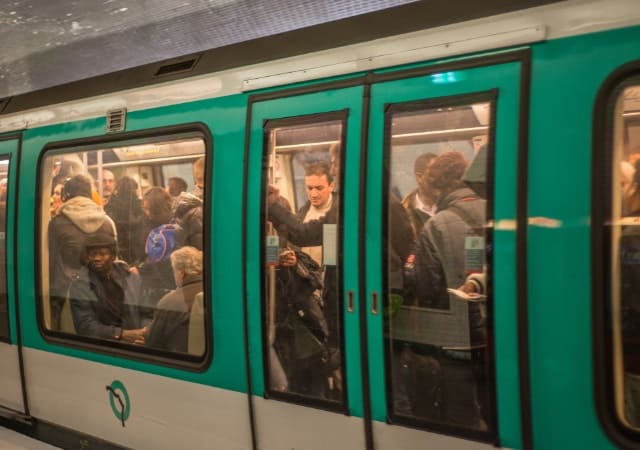
How to Avoid Pickpockets in Paris
Some tips may seem like common sense, but it’s always better to be safe than sorry.
Stay alert in crowds
Pickpockets like busy places. If you’re in a crowded area, pay extra attention to your belongings and avoid being distracted.
Avoid looking too much like a tourist
It’s a silly thing to say, but you’ll be more likely to be spotted if you’re carrying a large travel backpack rather than the bare essentials.
When I visit a city abroad, I hate the moment when I have to travel between the airport and my hotel. I feel vulnerable. If someone tries something, I can’t run after them with my 20kg suitcase.
Don’t put anything in your back trouser pockets
Whether it’s your phone or your wallet. It’s a common mistake many people make.
Don’t provoke pickpockets, who don’t ask for more.
Avoid clothes that are too large
Wear clothes with tightly closed pockets to make it harder to access their contents.
And most importantly, you’ll feel it.
So, no baggy pants!
Avoid carrying a lot of cash on you
You don’t really need to carry a lot of cash in Paris!
Most stores, restaurants, and cafés let you pay with credit cards, debit cards, and even digital wallets like Apple Pay or Google Wallet.
These apps let you pay with your phone without taking out your wallet. Just make sure to check that the card works internationally and has a small chip, which most machines in Paris use.
Also, remember: not every place takes cash, so it’s actually easier to pay with a card or app most of the time.
Wear your backpack in front of you in the metro
Nothing new here. Don’t tempt a pickpocket to unzip and see what’s inside.
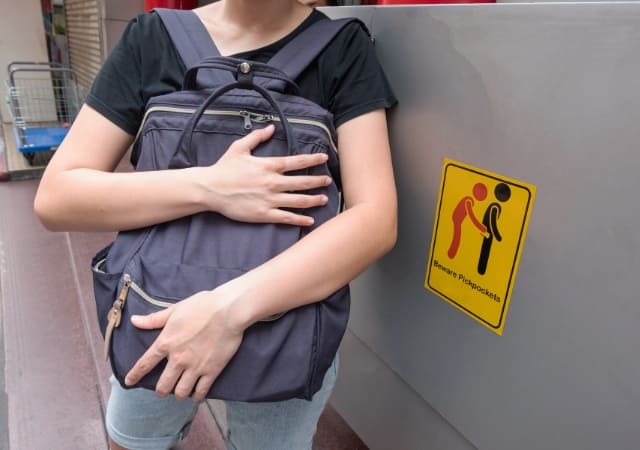
Keep your phone tucked away or in front of you
On the street or in metro corridors, don’t walk around with your phone in your hand on the side. If you’re not paying much attention to your surroundings, it’s easy for someone to snatch your phone.
If you keep it in front of you, it’s less tempting for the thief, and you have time to react.
Use zippers and buckles
Keep your bags closed and use zippers, buttons, or buckles to make it harder for someone to reach inside without you noticing.
Ignore Unusual “Helpers”
If a stranger suddenly offers help with cleaning something off your clothes or asks you to sign something, be cautious. They might be trying to distract you.
Avoid Holding Phones Near the Edge of Train Platforms
On busy train platforms, especially in the metro, pickpockets sometimes wait near the train doors, hoping to snatch valuables just as people are getting on or off.
If you’re holding your phone or any other valuable item while standing near the edge of the platform, it’s easy for someone to grab it quickly and disappear into the crowd.
In restaurants and bars, don’t put your bag on the back of your chair (or even on the floor)
This makes the backpack vulnerable and easy to steal.
I put it on the floor but between my legs. Sometimes I put a strap of the bag under a chair leg.
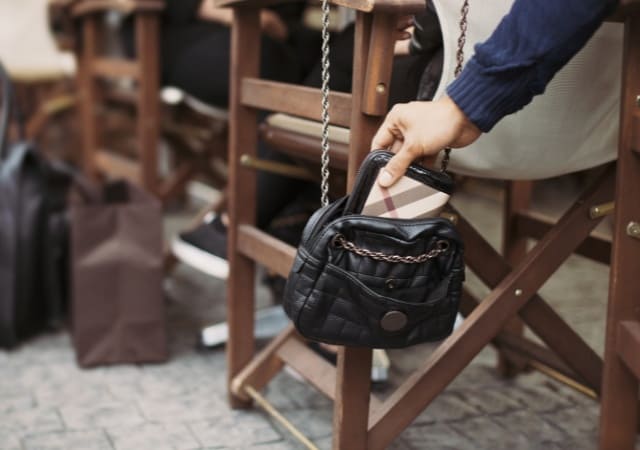
Don’t put your phone on the table in restaurants or bars
Here too, an unexpected distraction, and your phone could disappear. It’s very common.
Don’t hesitate to make eye contact
If someone looks suspicious, don’t hesitate to look them in the eye and show them you know they’re there.
It’s not a dangerous thing to do. Pickpockets aren’t generally violent and are keen to avoid confrontation at all costs.
And if you make googly eyes at an ordinary passenger by mistake, he or she will probably be tempted to look away, thinking “another nutcase…”
Useful Items to Help Protect Your Belongings
Here are some helpful items that can make it harder for pickpockets to steal from you:
- Anti-Theft Bags: These bags have special zippers that lock or hidden compartments that are hard for thieves to reach. Some even have slash-resistant material, so they can’t be easily cut open.
- Money Belts: A money belt is a small pouch you wear under your clothes, around your waist. It keeps your money, ID, and cards hidden and close to your body, making it harder for thieves to get to them.
- Portable Locks: If you’re carrying a backpack, a small lock can keep the zippers closed. This makes it tougher for anyone to unzip your bag without you noticing.
- RFID Blocking Wallets: Some pickpockets use scanners to steal information from credit cards without even touching them. An RFID-blocking wallet can help protect your card info from these scanners.
- Phone Lanyard: A lanyard that attaches to your phone can help keep it secure when you’re taking photos or using it for directions. It’s an extra way to make sure it doesn’t get snatched from your hand.
These products aren’t required, but they can give you extra peace of mind. With these tools, you can feel even more confident while exploring Paris!
What to Do If It Still Happens to You
If your personal belongings are stolen anyway, here are the steps you can take to prevent the situation from getting any worse.
- If you lose your phone, call your operator as soon as you can to block your line.
- If it’s your wallet you’ve lost, then block your credit card so you don’t get any surprise charges.
- Contact the local authorities to report the theft, which could help recover your belongings if the thief tries to resell them. Police officers in tourist areas are accustomed to helping visitors, and many understand basic English. When you visit a police station or gendarmerie, they’ll help you file an official report (called a “déclaration de vol”). They’ll ask for details about what was stolen, where it happened, and your contact information. This report can also be helpful if you need to make an insurance claim later.
Enjoying Paris Without Worry
Does all this mean you shouldn’t take the metro or visit the Eiffel Tower? Not at all.
Paris is one of the most beautiful cities in the world, and you deserve to enjoy every moment of it! The sights, the food, and the people make it a magical place.
While it’s smart to be careful, don’t let worry keep you from having fun. Most people have a safe, wonderful time in Paris just by staying aware and keeping track of their things.
Remember, pickpockets are just a small part of life in any big city. Keep your eyes open, follow these tips, and you’ll be free to explore Paris without stressing about “what ifs.”

With a passion for travel and having visited over 50 countries, Dorian is eager to share his favorite spots and expert tips to help you explore Paris and France like a local.

